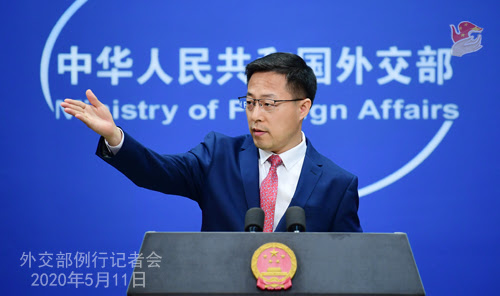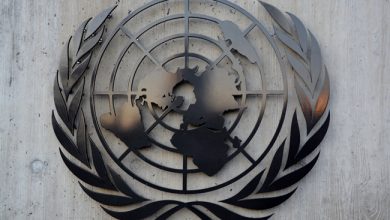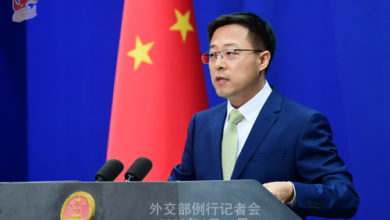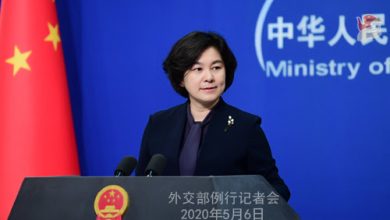China and Africa are good brothers and good friends sharing weal and woe

To support African countries in their response to COVID-19, the Chinese government has decided to send medical teams to Zimbabwe, the Democratic Republic of the Congo and Algeria. The teams are organized by the National Health Commission and members selected by the Health Commissions of Hunan Province, Hebei Province and Chongqing Municipality respectively. Among them, the team to Zimbabwe has already left China this morning, and those to the Democratic Republic of the Congo and Algeria will set off very soon.
China and Africa are good brothers and good friends sharing weal and woe. African countries provided valuable support to China when it was at a difficult phase in epidemic response. At present, Africa is facing a severe situation. China relates to its difficulties and will continue to provide various forms of support and assistance to African countries within its capacity. The Chinese government has provided many batches of urgently needed supplies to African countries. Chinese provinces and cities, enterprises and civil organizations have also lent a helping hand. In addition to sending medical teams, Chinese medical experts have held nearly 30 virtual exchanges with the African side, and Chinese medical teams in Africa have conducted nearly 400 training sessions in Africa, covering more than 20,000 people. China will continue to provide more anti-epidemic materials to African countries in accordance with the development of the situation and the wishes of African countries, and strengthen China-Africa cooperation in public health and disease prevention and control so that our two sides will jointly achieve the ultimate victory in the fight against COVID-19.
CCTV: Citing Germany’s BND spy agency, Der Spiegel reported that during a phone call on January 21, the Chinese leader asked WHO Director-General Tedros to hold back information about human-to-human transmission of the virus and delay declaring a pandemic. It also claimed that up to six weeks of time to fight the outbreak had been lost due to China’s information policy. Do you have any comment?
Zhao Lijian: The Chinese leader didn’t even have such a phone call with the WHO head on January 21. The WHO has made a detailed clarification on it. We hope certain media can observe professional ethics and stop spreading disinformation.
China News Service: While speaking by phone with President Xi, Russian President Putin said that Russia opposes finger-pointing at China under the pretext of the virus. Lately Russian officials and experts including Kremlin spokesman, foreign minister and ambassador to China all spoke against politicizing the pandemic and using it as a possible political weapon. They insisted on finding the truth through objective and scientific research. What’s your comment?
Zhao Lijian: We have noted that President Putin and Foreign Minister Lavrov explicitly expressed objection to a handful of countries’ attempts to smear China and pin the blame on it with regard to COVID-19. Many Russian political figures and academics have also spoken up recently, laying bare the absurdity of the Five Eyes report accusing China of covering up the coronavirus. China highly appreciates the Russian side’s objective and just position.
This stands as a strong illustration of the high-level China-Russia relationship. It also proves that solidarity, mutual assistance and the vision of building a community with a shared future for mankind is the mainstream aspiration of the international community. Those leveling unwarranted accusations against China and distorting COVID-19 information to deflect the blame to other countries will be detested and are doomed to fail.
Reuters: The US Department of Homeland Security issued new guidelines, restricting visas for Chinese-origin journalists to 90 days with possibility for extension. What’s China’s response to this move and is China planning any retaliation?
Zhao Lijian: We deplore and reject the erroneous move by the US side, which is an escalation of its political suppression of Chinese media. For a while, the US, entrenched in the Cold War mentality and ideological bias, launched one round of suppression after another against Chinese media. In December 2018, it demanded a Chinese media organization’s US office to register as “foreign agent”. More than 20 Chinese journalists’ visa applications have been denied without cause since 2018. In February 2020, the US designated five Chinese media organizations in the US as “foreign missions” and then placed a cap on the number of their staff, in effect expelling 60 Chinese journalists. Now it is resorting to discriminatory restrictive visa measures, severely disrupting Chinese media’s normal reporting in the US and affecting bilateral people-to-people and cultural exchange.
The US keeps talking about reciprocity. However, most American journalists in China are issued press cards and residence permits with one-year validity. In contrast, under the new rule issued by the US, Chinese reporters can only get visas allowing a stay of not more than 90 days. Is there any reciprocity in this? The US prides itself on press freedom and media transparency, but why is it so afraid of Chinese media’s reports?
The very nature of the reciprocity the US is claiming is prejudice, discrimination and intolerance towards Chinese media. It has been using this so-called “reciprocity” as an excuse to escalate political suppression against Chinese media. This will severely affect Chinese media’s normal coverage in the US. We urge the US to immediately correct its mistake. Otherwise, China will have to take countermeasures.
Phoenix TV: According to the US State Department website, US Secretary of State Pompeo said again in recent interviews that the virus originated in Wuhan and the Chinese government didn’t act fast enough to share the information. He also attacked China’s religious policies and political system. Could you comment on his remarks?
Zhao Lijian: This is not the first time for Mr. Pompeo to spread such fallacies. As is seen by all, he is merely telling the same old lies. But repetition doesn’t turn a lie into truth, and it certainly won’t obstruct the Chinese people from forging ahead along the path of socialism with Chinese characteristics.
We advise the US politicians to stop their deceiving tricks and avoid more self-inflicted humiliation.
China Review News Agency: New Zealand’s Deputy Prime Minister and Foreign Minister Winston Peters said the other day that New Zealand would support Taiwan’s request for an observer role at the World Health Assembly. Peters also said that previous discussions with senior Chinese officials gave him confidence there would be no pushback to New Zealand’s decision. What is your response?
Zhao Lijian: Such erroneous remarks on the New Zealand side severely violate the one-China principle. China deplores and opposes them and has lodged representations with the New Zealand side.
On the Taiwan region’s participation in WHO activities, China’s position is clear and consistent. The one-China principle must be observed. Based on this principle, the central government of China has made proper arrangements for Taiwan region’s participation in global health events, which ensures that the Taiwan region can promptly and effectively respond to local and global public health incidents. The Taiwan authorities chose to play up its so-called participation in WHO events and return to the WHA at this moment. The timing reveals its true motive, which is to use the current outbreak to seek “Taiwan independence”. It is out-and-out political manipulation.
The one-China principle is the political foundation of China-New Zealand relations. It is the fundamental underpinning of the progress achieved in bilateral relations since the establishment of diplomatic ties. China urges New Zealand to strictly abide by the one-China principle and immediately stop its wrong actions on Taiwan-related issues to avoid damaging bilateral relations.
As for Peters claiming that he has been assured by the Chinese leadership that there would be no pushback to New Zealand’s decision, I wonder how he came to that assumption? I want to point out that China is committed to developing friendly cooperative relations with New Zealand based on mutual respect and equality. But we are firmly resolved to uphold our sovereignty, independence and territorial integrity. No one should entertain any illusion when it comes to matters concerning China’s core interests. We hope that certain people in New Zealand will stop spreading rumors and creating trouble and work to enhance instead of undermining bilateral mutual trust and cooperation.
CNN: According to the New York Times, the US government is going to issue a warning accusing China of attempting to acquire US intellectual property rights on COVID-19 and public health data through illegal means. Can you tell us your reaction to this?
Zhao Lijian: China is a staunch upholder of cyber security and a victim to cyber attacks. We firmly oppose and fight all kinds of cyber attacks conducted by hackers.
We are leading the world in COVID-19 treatment and vaccine research. It is immoral to target China with rumors and slanders in the absence of any evidence.
South China Morning Post: Indonesian foreign minister said on May 10 that the Indonesian sailors were subjected to different treatment on board a Chinese offshore fishing vessel. The Indonesian side condemned this. I wonder if China is investigating this? Is it communicating with the Indonesian side?
Zhao Lijian: China takes that report very seriously and is looking into it. At the current stage, it seems that some of the media reports are not factual. The Chinese side is in close communication with the Indonesian side on this and will properly deal with the issue based on facts and law.
The Globe and Mail: In addition to New Zealand, several Western countries are also calling for Taiwan’s inclusion as an observer at the World Health Assembly. What’s your comment?
Zhao Lijian: China’s position on issues relating to the Taiwan region in WHO is consistent and clear.
AFP: Two Chinese coast guard vessels chased a Japanese fishing boat near the Diaoyu Island. So Japan lodged an official protest with China over this incident. What is your position on that incident? Did China offer any explanation or apology to the Japanese side?
Zhao Lijian: China Coast Guard discovered a Japanese fishing boat illegally operating in China’s territorial sea while performing regular patrol in waters around Diaoyu Island. The Chinese Coast Guard vessels followed and monitored the boat in accordance with law, asking it to immediately halt its activities and leave the relevant waters, and responded to the illegal disruption by a Japan Coast Guard vessel that came to the spot. The Chinese side has lodged representations with the Japanese side through diplomatic channels, urging it to immediately stop its infringements.
I want to stress that Diaoyu Island and its affiliated islands are an inherent part of China’s territory, and it is our inherent right to carry out patrols and law enforcement activities in these waters. We ask the Japanese side to honor its four-point principled agreement with China, avoid triggering more incidents relating to the Diaoyu Island and make concrete efforts for stability in the East China Sea.
The Paper: Vietnamese foreign ministry spokesperson said in a statement on May 8 that Vietnam protests against China’s unilateral fishing ban in the South China Sea and demands that China stop further complicating the situation in the South China Sea. The Vietnam Fisheries Society said China’s regulation violates Vietnam’s “sovereignty” over the Xisha Islands and relevant waters, asking fishermen to enhance production and uphold their “legitimate interests”. I wonder if you have any comment?
Zhao Lijian: Xisha Islands are indisputably Chinese territory. According to international law and China’s domestic law, China enjoys sovereign rights and jurisdiction over relevant waters in the South China Sea. It is a legitimate measure to lawfully exercise administrative rights and fulfill international obligations by practicing fishing moratorium in summer in relevant waters of the South China Sea. It’s for the conservation and sustainable development of fishery resources in the South China Sea.
Vietnam has no right to make unwarranted accusations against China, not to mention encouraging its fishermen to infringe upon China’s rights and interests and undermining the sustainable development of fishery resources in the South China Sea.
Reuters: The Australian government said on Sunday that they were concerned that China may issue tariffs on exports of Australian barley. Can you confirm if China plans to issue such tariffs?
Zhao Lijian: We have noted relevant reports. Based on my information, this is a normal trade remedy investigation. The Chinese side is moving ahead with the investigation in accordance with relevant laws and WTO rules. I would refer you to the competent department for more details.
NHK: Regarding the Diaoyu Island, according to my understanding, it is very rare for China to take measures on Japanese fishing boats, so it seems that China is acting more aggressively in the waters off the Diaoyu Island. What’s your view on China-Japan relations in the future?
Zhao Lijian: I clearly stated China’s position earlier. China asks the Japanese side to abide by the four-point principled agreement, avoid triggering more incidents relating to the Diaoyu Island, and safeguard stability in the East China Sea with concrete actions.
At present, China and Japan should focus on fighting COVID-19 together and enhancing friendly cooperative relations.
Shenzhen TV: After the US claimed that the US and the UK defeated the Nazis, Russian Ambassador to the US Anatoly Antonov reportedly said, today not all are happy for our victory; some attempt to misrepresent history; but Russia will not allow anyone to forget its role in defeating Nazi Germany. I wonder if China has a comment?
Zhao Lijian: This year marks the 75th anniversary of the victory of WWII and the founding of the UN. As major victorious nations of WWII and permanent members of the UN Security Council, China and Russia both remain committed to the widely-recognized view on WWII history and stand against attempts at misrepresenting history.
As President Xi pointed out in a phone call with President Putin on May 8, WWII is an unprecedented calamity in human history. China and Russia, as the main theaters in Asia and Europe during the war, made tremendous sacrifices for and indelible contributions to its final victory, thus saving mankind from demise. This chapter of history is worth remembering forever.
China believes that all members of the international community should firmly uphold the victory of WWII and international fairness and justice, support and practice multilateralism, and stay committed to building world peace, contributing to global development, and maintaining the international order.





